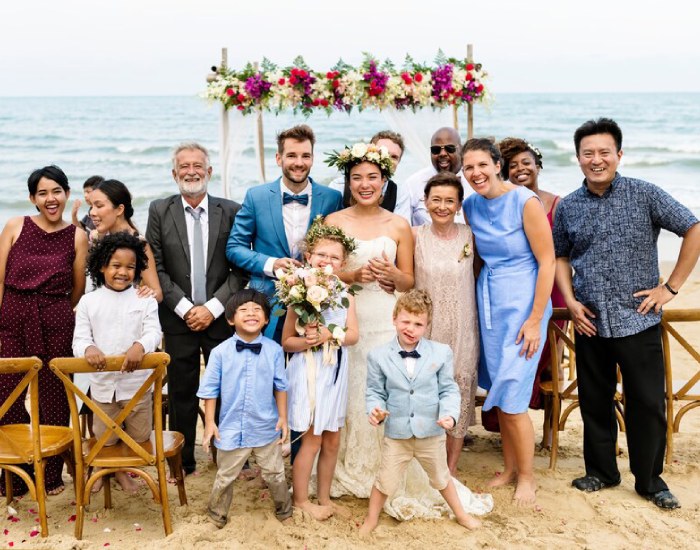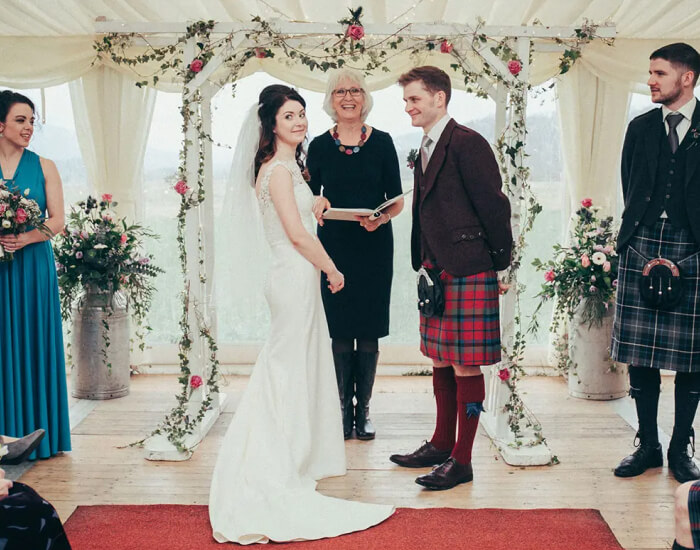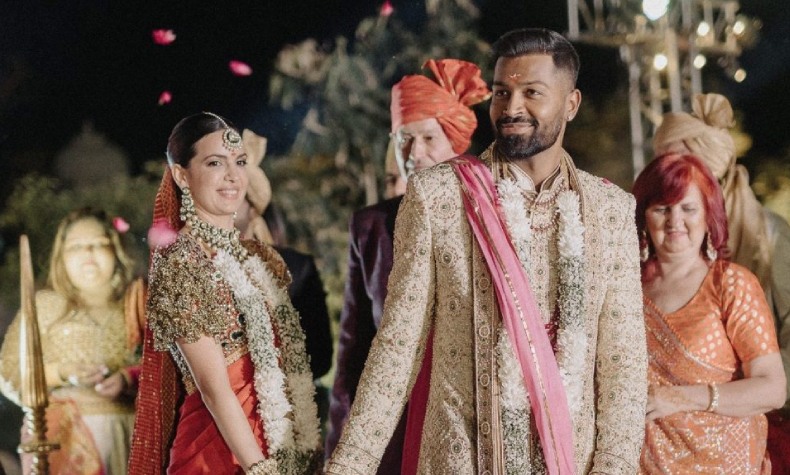You must have heard people often saying, “Love knows no barrier.” To some extent, it is true. However, Interfaith Wedding when it comes to taking things to the next level, meaning getting hitched, things start to disturb couples a lot.
It is because love includes only two people, but when it comes to the wedding, two families get involved. In the case of normal marriages, meaning same faith marriage, you don’t need to bother too much about things. However, when it comes to interfaith weddings, things get a little tricky. Yes, there are several things that you need to understand prior to getting married to the love of your life.
Worried about an interfaith wedding? Here’s some advice on how to pull it off.
So, let’s get started…
Table of Contents
What is an Interfaith Wedding?
What Factors Contribute to the Success of Interfaith Weddings?
Top 10 Tips To Plan An Interfaith Wedding
- Understand things inside out
- Pick two officiants
- Locate an officiant who is respectful of all faiths
- Involve your families
- Attend premarital counselling before getting married
- Inform your guests in advance
- Write wedding vows keeping both traditions in mind
- Incorporate elements from both religions in the wedding decor
- Omit what is not needed
- Enjoy it to the fullest
Before we take a deep dive into it, let’s first understand the basics of interfaith weddings. Here we go…
What is an Interfaith Wedding?
An interfaith wedding, also known as mixed faith wedding, is a wedding in which people from two different faiths tie the knot. Everything, from the rites and customs of both religions, is incorporated into an interfaith wedding ceremony and reception.
More often than not, couples choose to get married in their place of worship at such weddings. However, if you choose to get married somewhere other than a place of worship associated with your respective faiths, they will need a second religious blessing in such a situation.
Sometimes when a wedding between people of different faiths takes place, couples choose to have a religious service and a secular reception.
What Factors Contribute to the Success of Interfaith Weddings?
Know that marriages between people of different faiths give rise to an entirely new set of challenges. Only winning both sets of parents is not just enough. You also need to determine your fundamental beliefs and work together to build a future. Getting on the same page is beneficial to every marriage, regardless of their religious affiliation.
It is essential that you, as a couple, are aware of and make an effort to embrace the religious practices and cultural customs of one another.
In addition, communication is one of the most critical aspects in ensuring that a couple has a shared understanding of the fundamental concerns and principles that guide their lives.
If you see, two people, even if they belong to the same faith, come from different backgrounds altogether. Definitely, they also have to understand each other before coming together to form one cohesive unit. In the case of interfaith weddings, couples need to go the extra mile to take things forward.
Premarital education and counselling are essential for both to strive for a spiritual connection as a basis for marital joy. It can help the couple to be prepared for any potential challenges that may arise. In order to help avert unexpected disputes, it is helpful to consult clergy from each denomination to help lead difficult conversations.
The formation of new connections with other couples going through the same process of preparing for an interfaith marriage is another benefit of attending sessions in a group setting.
Above all, both partners must have patience, understanding and be open to communicating if they really want to have a successful marriage. As long as you continue to demonstrate the same patience, understanding, and communication, you will find a way to make it work.
Top 10 Tips To Plan An Interfaith Wedding
The best thing about the interfaith wedding is that you can organize it in several ways. You are not restricted to a particular religious rite in this case. In fact, incorporating religions and the customs of both religions make a wedding ceremony one-of-a-kind for sure.
Here are some of the best tips to plan an interfaith wedding. Take a look…
1. Understand things inside out
As every wedding starts with an understanding of each other’s requirements, an interfaith wedding is also no different. Before you begin the planning process of your interfaith wedding, make sure to research various components of both faiths.
By doing enough research about both faiths, you can choose which particulars are most significant to both of you. As said earlier, an interfaith wedding is a union between people of two different faiths. Obviously, you’ll need to incorporate elements of both faiths in your wedding so that both families are happy in the end. Also, it will provide your guests with a window into both religions.
For instance, if you’re a Hindu woman getting married to a Christian guy, surely both of you’ll need to understand the customs and traditions of Hinduism and Christianity to have a successful wedding ceremony.
All in all, your big day should capture what the two of you want, who you are as a couple, and the amount of love that you have for one another.
2. Pick two officiants
In most cultures, there is a trend of having two officiants, one from the groom’s side and another from the bride’s side. So, why shall you pick just one in an interfaith wedding?
Of course, you don’t need to compromise at all when it comes to an interfaith wedding. Having two officiants (one from each side) will help you represent your respective religion.
Make sure you meet with the officiant of your choice. Ask your officiant a lot of questions when you are in the process of organizing your wedding ceremony that will include elements from many faiths.
Also See: Tips for Hiring a Wedding Officiant
3. Locate an officiant who is respectful of all faiths
Finding the right officiant may seem like a task. Of course, you will want someone to preside over the wedding who can easily and politely include all of your beliefs, as well as the faith of your partner, into the ceremony in a beautiful way.
Hence, it is crucial to look for the right officiant who is respectful of all faiths. You will need to do some research in order to determine which religious leaders would be available to co-officiating with an officiant who is from a different faith.
It is crucial that you communicate your expectations to the potential officiants of your ceremony very well in advance. Aside from that, maintaining open communication between the two officiants is also very important. You don’t want any chaos later during the wedding procession. It’s advised to have one-on-one meetings with each of your officiants as well as group meetings so that you can prepare and make sure all of your officiants are on the same page.
4. Involve your families
Whether you believe it or not, you might not be aware of all your traditions and customs for sure. There will be several things that you’ll need to understand before you begin your wedding planning. In such as situation, your family people are the best bets to guide you through the whole wedding process in your tradition.

It’s always good to involve your families in an interfaith wedding. They can guide you through the process and help you plan a perfect interfaith wedding. Ask your families more and more questions related to wedding ceremonies in your traditions.
This way, you can be sure of having a solid understanding of your customs and your significant other’s traditions. Also, using the elements of both cultures will make the event look more genuine and enchanting.
5. Attend premarital counselling before getting married
Premarital counselling is gaining immense popularity these days. Whether you two belong to the same faith or different faiths, premarital counselling can help significantly. For example, if you are having a Catholic ceremony as well as a non-religious ceremony, the Catholic church requires that you go through premarital counselling before you may have your Catholic ceremony. If you want to have your Catholic ceremony, you must comply with this requirement.
Premarital counselling can help both to strive for a spiritual connection as a basis for marital joy. It can even help them be prepared for any potential challenges that may arise in the future. Many interfaith officiants these days provide counselling services as an additional component of their offerings.
Marriage counseling is undoubtedly beneficial for all kinds of couples, including those from different religious backgrounds. It is a good way to learn, to get exposure to new things in life, and to communicate with each other and your families.
6. Inform your guests in advance
Your guests are important! They include everyone from your close family members to your relatives and close friends. They deserve to know about your interfaith wedding in advance. It is because every person has their own perspective when it comes to weddings. If you do not inform them in advance, they may find it weird to adjust to the things at the event.
Therefore, it is crucial that you inform your wedding guests about the traditions that they will also be witnessing during the ceremony. You can even explain the significance of the traditions that will be observed at the wedding on your wedding website.
It will help your guests be part of the ceremony without any hesitation. Ask your interfaith officiant to explain the rituals to your guests as you carry them out on the big day. It will make it easier for them to follow along and make them feel more of a part of the celebration.
7. Write wedding vows keeping both traditions in mind
Your wedding vows are an excellent way you can utilize to explain the excitement of getting into an interfaith wedding. It is a great way you can show respect for both of your religions.

Write your wedding vows in such a way that shows how you two are going to be respectful towards each other’s faith. You can even speak to both the officiants and consult them when writing your wedding vows.
8. Incorporate elements from both religions in the wedding decor
Every religion has something unique about it. Whether you follow Hinduism or Christianity, there is something unique about every religion. You can utilize the unique elements of both faiths in your interfaith wedding décor.
Have fun fusing elements of your respective cultures and faiths into the design of your wedding ceremony. For instance, a Hindu and Jewish interfaith wedding ceremony can include the construction of a mandap-chuppah building. This is because both structures represent the establishment of a new household and the coming together of the couple and their families.
To honour both religions, you can choose to decorate the venue with traditional materials associated with your respective faith.
9. Omit what is not needed
You don’t need to follow all the customs of both the faith in order to have your wedding recognised as a valid union. Pick the customs that are necessary and omit all that you believe are not required. You can consult with the interfaith officiant performing the ceremony or other members of your family about the rites that they believe should be performed in order to make the occasion more meaningful.
However, at the end of the day, it is up to you to decide which traditions you want to include in your interfaith wedding ceremony.
10. Enjoy it to the fullest
It doesn’t make a difference what sort of wedding you’re having. Your wedding is an unforgettable, once-in-a-lifetime experience, regardless of whether you’re marrying someone of the same or a different faith. Enjoy your wedding to the fullest.
Of course, at the outset, it all will look very challenging. There will be times when you’ll find yourself getting confused about things. Or maybe some things will not even happen your way. But you don’t need to worry about those trivial issues. Just be calm and happy. Everything will fall in place for sure.
The best thing about an interfaith wedding is that you get to learn a great deal of things about the faith other than yours. Just focus your energy on learning, enjoying, and living every moment as it comes.
Wrapping up….
So, there you have it: the top 10 tips to plan an interfaith wedding. Hopefully, this article has been informative for you and will help you organize a stunning interfaith wedding.
Know that there are no hard and fast rules to host an interfaith wedding ceremony. You can plan a unique interfaith wedding using the elements from both faiths. The best you can do is to discuss everything related to your wedding in advance with your partner, family, and the interfaith officiant who will preside over the event. Doing so will help you have clarity about the whole process, and you can be sure of a seamless wedding event in the end.
Happy Wedding… 😊 😊







